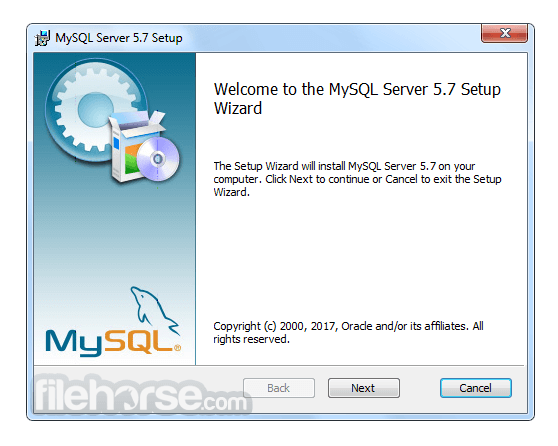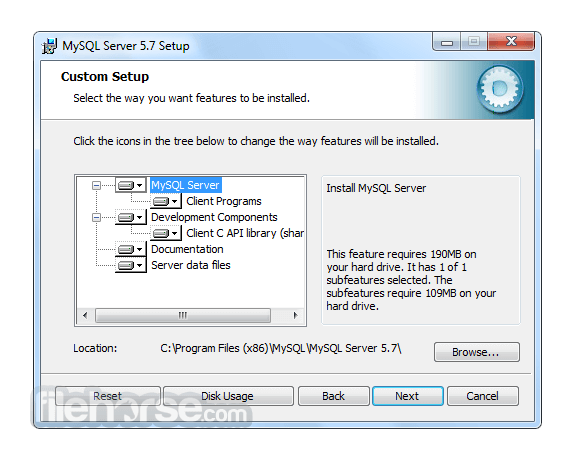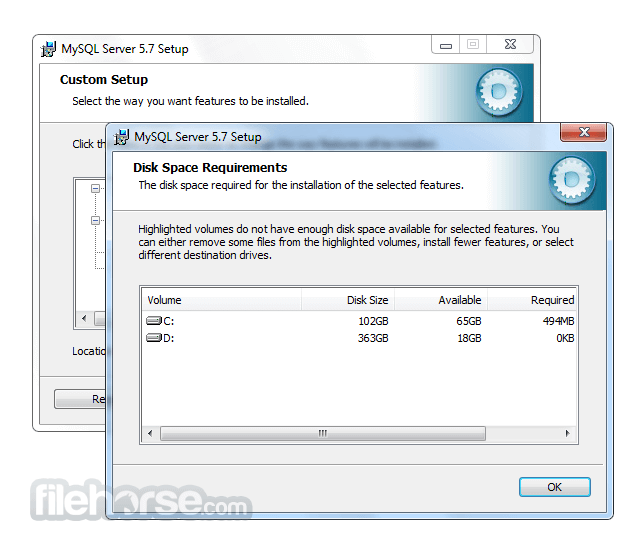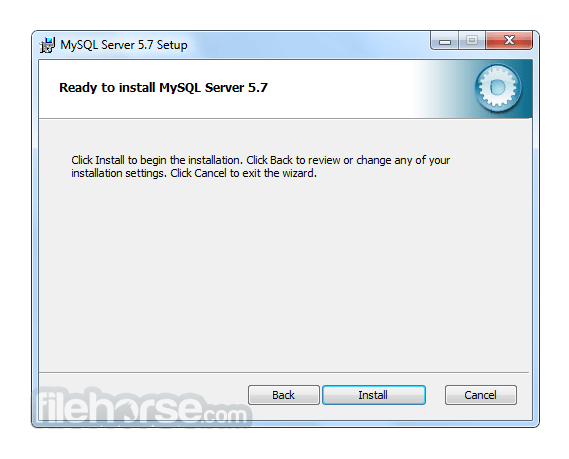-
Latest Version
-
Operating System
Windows XP / Vista / Windows 7 / Windows 8
-
User Rating
Click to vote -
Author / Product
-
Filename
mysql-5.6.23-win32.msi
-
MD5 Checksum
3eafb5d84cc97b06f72cbff2adb89dd0
Sometimes latest versions of the software can cause issues when installed on older devices or devices running an older version of the operating system.
Software makers usually fix these issues but it can take them some time. What you can do in the meantime is to download and install an older version of MySQL 5.6.23 (32-bit).
For those interested in downloading the most recent release of MySQL or reading our review, simply click here.
All old versions distributed on our website are completely virus-free and available for download at no cost.
We would love to hear from you
If you have any questions or ideas that you want to share with us - head over to our Contact page and let us know. We value your feedback!
What's new in this version:
Security Notes:
- The linked OpenSSL library for the MySQL Commercial Server has been updated from version 1.0.1j to version 1.0.1k.
- This change does not affect the Oracle-produced MySQL Community build of MySQL Server, which uses the yaSSL library instead. (Bug #20375530) Functionality Added or Changed:
- Support for the SSL 2.0 and SSL 3.0 protocols has been disabled because they provide weak encryption. Support was added for the TLS 1.1 and TLS 1.2 protocols. (Bug #19820550)
- References: See also Bug #19921150
- yaSSL was upgraded to version 2.3.7. (Bug #19695101, Bug #20201864)
- The valid date range of the SSL certificates in mysql-test/std_data has been extended to the year 2029. (Bug #18366947) Bugs Fixed:
- InnoDB: A tablespace export operation set the purge state to PURGE_STATE_STOP but the purge thread did not check the purge state until the current purge operation was completed. In the case of a large history list, the tablespace export operation was delayed, waiting for the current purge operation to finish. The purge state is now checked with every purge batch. (Bug #20266847, Bug #75298)
- InnoDB: An ALTER TABLE ... ADD INDEX operation raised an assertion due to assertion code that did not allow an online index status of ONLINE_INDEX_ABORTED_DROPPED. The assertion code has been relaxed. (Bug #20198726)
- InnoDB: An error occurred when the push_warning_printf function was invoked during server recovery. This function was previously used to print a warning message to the client. Also, current_thd was NULL when the server was restarted. (Bug #20144839)
- InnoDB: An ALTER TABLE operation that changed the name of a foreign key column resulted in a failure when reloading the foreign key constraint. The previous column name remained in the data dictionary cache instead of being evicted. (Bug #20031243)
- InnoDB: Error messages regarding a size limitation on BLOB or TEXT data inserted in a single transaction have been revised. (Bug #19975322)
- InnoDB: DML operations on a table with full-text search indexes raised an invalid assertion. (Bug #19905246)
- References: This bug is a regression of Bug #19314480.
- InnoDB: A multiple-table delete operation caused the server to halt. (Bug #19815702)
- InnoDB: A FLUSH TABLES operation raised an assertion. (Bug #19803418)
- InnoDB: With change buffering enabled, a buffered sequence of operations that should not have been buffered resulted in an Unable to purge a record error. (Bug #19528825, Bug #73767)
- InnoDB: On non-Windows platforms, os-file_pread and os_file_pwrite functions return -1 when an error occurs. This value was printed in an error message as the number of bytes read or written. Instead of printing the -1 value in the error message, a separate error message indicating a system call failure is now printed. Thanks to David Bennett for the patch. (Bug #19315210, Bug #73365)
- InnoDB: A slow shutdown (innodb_fast_shutdown=0) after crash recovery raised an assertion. Slow shutdown did not wait for background rollback operations to finish before proceeding. (Bug #16862810)
- InnoDB: The integer column value was handled incorrectly for the memcached incr and decr commands. (Bug #69415, Bug #20083106, Bug #74874, Bug #20044123)
- Partitioning: A failed ALTER TABLE ... TRUNCATE PARTITION statement or a failed TRUNCATE TABLE statement against a partitioned table sometimes left inconsistent metadata in the table cache; subsequent SQL statements reusing this metadata failed, and could in some cases also lead to a failure of the server. (Bug #74292, Bug #19786861)
- Replication: If a client thread on a slave executed FLUSH TABLES WITH READ LOCK while the master executed a DML, executing SHOW SLAVE STATUS in the same client became blocked, causing a deadlock. The fix ensures that the read lock is only held during the period that the relay log is being updated and the deadlock is avoided. (Bug #19843808)
- Replication: When an XA transaction was active, executing an internal rollback, for example using the BINLOG statement, resulted in an assertion. The fix ensures that a rollback happens only for a slave when a transaction spans multiple binary log files. Rollback does not happen now if the Format_description comes from the BINLOG statement being executed in the MySQL client. (Bug #74597, Bug #19928622)
- Replication: In normal usage, it is not possible for a slave to have more GTIDs than the master. But in certain situations, such as after a hardware failure or incorrectly cleared gtid_purged, the master's binary log could be truncated. This fix ensures that in such a situation, the master now detects that the slave has transactions with GTIDs which are not on the master. An error is now generated on the slave and the I/O thread is stopped with an error. The master's dump thread is also stopped. This prevents data inconsistencies during replication. (Bug #72635, Bug #18789758)
- Replication: When using SHOW SLAVE STATUS to monitor replication performance, Seconds_Behind_Master sometimes displayed unexpected lag behind the master. This was caused by Previous_gtids_log_events being written to the slave's relay log with a timestamp behind the master, and then being used to calculate the Seconds_Behind_Master. This fix ensures that events generated on the slave that are added to the relay log and are not used when calculating Seconds_Behind_Master. (Bug #72376, Bug #18622657)
- On Ubuntu 14.10, MySQL install operations could fail to reload AppArmor. (Bug #20092641)
- EXPLAIN within an XA transaction could raise an assertion. (Bug #19941492)
- Binary log files created by streaming the binary log from a remote server with mysqlbinlog were given an access mode more permissive than the original files. (Bug #19649868)
- If the audit_log plugin encountered a disk-full error, the server would exit.
- Now, if the file system to which the audit log is being written fills up, a “disk full” error is written to the error log. Audit logging continues until the audit log buffer is full. If free disk space has not been made available by the time the buffer fills, client sessions will hang, and stopping the server at the time of client sessions hanging will result in audit log corruption. To avoid this if client sessions are hung, ensure that free space is available on the audit logging file system before stopping the server. (Bug #19411485)
- For failure to create a temporary table due to being out of file descriptors, the server exited rather than returning an error. (Bug #18948649)
- For some queries that contained a derived table (subquery in the FROM clause), delay of materialization resulted in a suboptimal execution plan due to a less accurate row-count estimate. (Bug #18607971)
- For UPDATE and DELETE statements, the server could exit after attempting to access an uninitialized data structure. (Bug #18036143)
- Starting the server with start service or mysqld_safe could result in failure to use the correct plugin directory. (Bug #17619241)
- FLUSH TABLES on a FEDERATED table failed if the table had been idle longer than the wait_timeout time plus the TCP keepalive time. (Bug #17599258)
- Selecting all columns from INFORMATION_SCHEMA.TABLES did not reopen tables if they were in the table cache, but selecting a subset of those columns under the same conditions did reopen tables. (Bug #16869534)
- If my_write() encountered a disk-full condition, it could return an incorrect error value. (Bug #16078792, Bug #19984788)
- InnoDB boolean full-text searches incorrectly handled + combined with parentheses; for example, +word1 +(>word2
 OperaOpera 117.0 Build 5408.35 (64-bit)
OperaOpera 117.0 Build 5408.35 (64-bit) PC RepairPC Repair Tool 2025
PC RepairPC Repair Tool 2025 PhotoshopAdobe Photoshop CC 2025 26.3 (64-bit)
PhotoshopAdobe Photoshop CC 2025 26.3 (64-bit) OKXOKX - Buy Bitcoin or Ethereum
OKXOKX - Buy Bitcoin or Ethereum iTop VPNiTop VPN 6.3.0 - Fast, Safe & Secure
iTop VPNiTop VPN 6.3.0 - Fast, Safe & Secure Premiere ProAdobe Premiere Pro CC 2025 25.1
Premiere ProAdobe Premiere Pro CC 2025 25.1 BlueStacksBlueStacks 10.41.661.1001
BlueStacksBlueStacks 10.41.661.1001 Hero WarsHero Wars - Online Action Game
Hero WarsHero Wars - Online Action Game TradingViewTradingView - Trusted by 60 Million Traders
TradingViewTradingView - Trusted by 60 Million Traders LockWiperiMyFone LockWiper (Android) 5.7.2
LockWiperiMyFone LockWiper (Android) 5.7.2










Comments and User Reviews